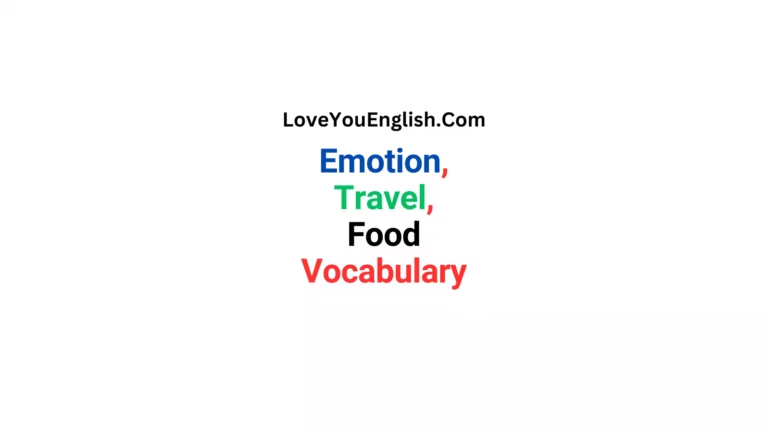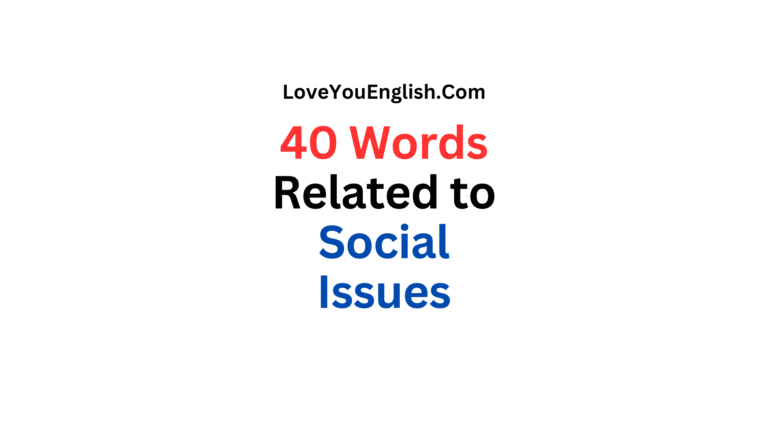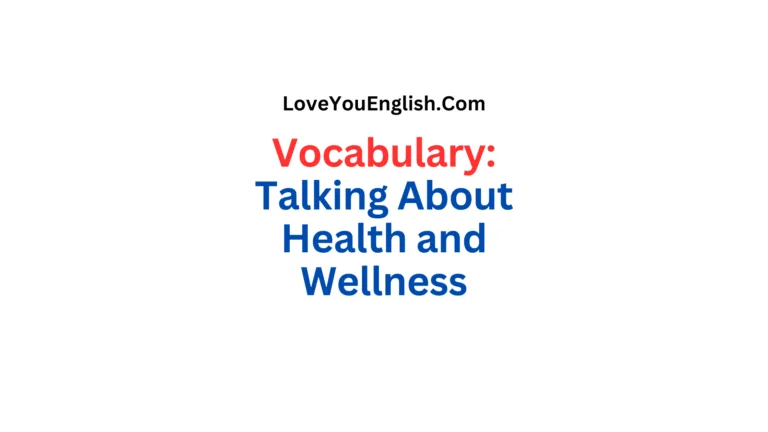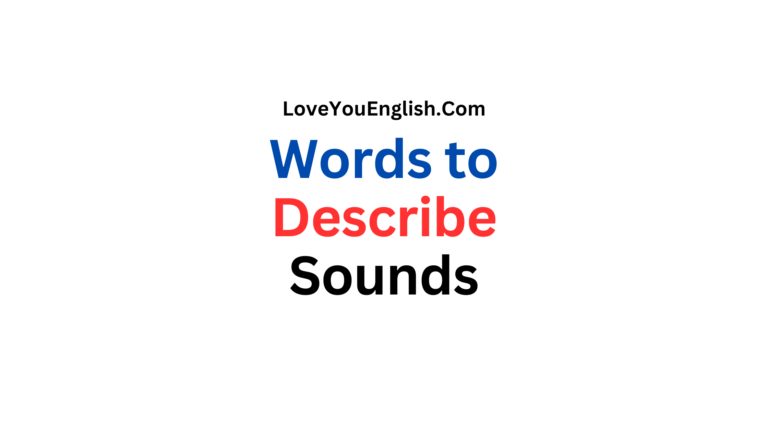30 Advanced IELTS Words to Boost Your English Skills
Sharing is caring!
If you’re preparing for the IELTS exam, you know that a strong vocabulary is crucial for success.
One way to improve your vocabulary is to learn advanced words that can help you achieve a higher score, especially in the writing and speaking sections.
In this blog post, we’ll explore 30 advanced IELTS words that are useful for both the Academic and General Training versions of the test.
I’ll break down each word with a clear definition, examples, and tips on how to use them effectively. Let’s dive in!
1. Advocate
Definition: To support or argue in favor of something.
Example: She is an advocate for environmental protection.
Usage Tip: Use “advocate” when you want to express support for a cause or idea.
2. Alleviate
Definition: To make a problem or suffering less severe.
Example: The new policy aims to alleviate the financial burdens on students.
Usage Tip: “Alleviate” is great for discussing solutions to problems or challenges.
3. Acknowledge
Definition: To recognize or accept the existence of something.
Example: It’s important to acknowledge the contributions of others.
Usage Tip: Use “acknowledge” to show that you accept or recognize something as true or valid.
4. Beneficial
Definition: Producing good or helpful results.
Example: Regular exercise is beneficial for your health.
Usage Tip: “Beneficial” is ideal for discussing positive effects or advantages.
5. Comprehensive
Definition: Thorough and all-encompassing.
Example: The report provides a comprehensive overview of the economic situation.
Usage Tip: Use “comprehensive” to describe something that covers all aspects of a subject.
6. Diverse
Definition: Showing a great deal of variety.
Example: The city has a diverse population with many cultures.
Usage Tip: “Diverse” is useful for describing a range of different elements or people.
7. Enhance
Definition: To improve or make something better.
Example: Reading regularly can enhance your vocabulary skills.
Usage Tip: Use “enhance” when you want to talk about improving or increasing something.
8. Evaluate
Definition: To judge or determine the value of something.
Example: Teachers need to evaluate students’ progress throughout the year.
Usage Tip: “Evaluate” is key for discussing assessments or judgments.
9. Facilitate
Definition: To make a process easier or more convenient.
Example: New technologies facilitate communication between people around the world.
Usage Tip: Use “facilitate” when discussing ways to make tasks or processes simpler.
10. Highlight
Definition: To emphasize or draw attention to something.
Example: The speaker highlighted the importance of education for all children.
Usage Tip: “Highlight” is great for emphasizing important points or ideas.
More Vocabulary:
- 30 Descriptive Words in English Explained Simply
- 20 Advanced English Verbs You Need to Know
- English Vocabulary: 40 Emotion Words to Express How You Feel
- 25 Advanced English Verbs to Level Up Your Language Skills
- 25 Advanced English Adjectives to Elevate Your Vocabulary
11. Illustrate
Definition: To explain or make something clear through examples.
Example: The case studies illustrate the benefits of sustainable farming.
Usage Tip: Use “illustrate” when you want to explain something with examples or details.
12. Imply
Definition: To suggest something without saying it directly.
Example: His comments implied that he was unhappy with the decision.
Usage Tip: “Imply” is useful for talking about what is suggested indirectly.
13. Justify
Definition: To show that something is reasonable or acceptable.
Example: She needed to justify her decision to the committee.
Usage Tip: Use “justify” when explaining the reasons behind a choice or action.
14. Legitimate
Definition: Allowed by law or reasonable.
Example: The company’s actions were considered legitimate by the court.
Usage Tip: “Legitimate” is useful for discussing legality or reasonableness.
15. Mitigate
Definition: To make a problem less severe.
Example: Measures were taken to mitigate the effects of the natural disaster.
Usage Tip: Use “mitigate” to talk about reducing negative impacts.
16. Noteworthy
Definition: Worth paying attention to.
Example: The scientist’s discovery was noteworthy for its innovative approach.
Usage Tip: “Noteworthy” is great for mentioning something significant or important.
17. Obtain
Definition: To get something.
Example: She worked hard to obtain her degree.
Usage Tip: Use “obtain” when referring to acquiring or achieving something.
18. Prohibit
Definition: To officially forbid something.
Example: The law prohibits smoking in public places.
Usage Tip: “Prohibit” is ideal for discussing rules or laws that forbid actions.
19. Reinforce
Definition: To make something stronger or more effective.
Example: The teacher used examples to reinforce the lesson’s main points.
Usage Tip: Use “reinforce” when talking about strengthening or supporting ideas or structures.
20. Significant
Definition: Important or meaningful.
Example: The results of the study had significant implications for future research.
Usage Tip: “Significant” is useful for emphasizing importance or impact.
21. Sustain
Definition: To maintain or keep something going over time.
Example: It’s challenging to sustain a healthy lifestyle with a busy schedule.
Usage Tip: “Sustain” is great for discussing long-term maintenance or support.
22. Tackle
Definition: To deal with a problem or challenge.
Example: We need to tackle the issue of climate change urgently.
Usage Tip: Use “tackle” for addressing or solving problems.
23. Underpin
Definition: To support or form the basis for something.
Example: Strong research underpins the development of effective policies.
Usage Tip: “Underpin” is useful for talking about the foundation or support for ideas or structures.
24. Vivid
Definition: Producing powerful or clear images in the mind.
Example: The book’s vivid descriptions made the setting come to life.
Usage Tip: Use “vivid” to describe something that is very clear or striking.
25. Widespread
Definition: Existing or happening over a large area.
Example: The use of smartphones is widespread across the globe.
Usage Tip: “Widespread” is ideal for talking about things that are common or extensive.
26. Yield
Definition: To produce or provide something.
Example: The farm’s new techniques yielded a better crop.
Usage Tip: Use “yield” for discussing the production of results, benefits, or resources.
27. Zealous
Definition: Showing great enthusiasm or energy.
Example: She is a zealous advocate for animal rights.
Usage Tip: “Zealous” is useful for describing passionate or enthusiastic behavior.
28. Contrast
Definition: To compare two things to show their differences.
Example: The essay contrasts the education systems of two different countries.
Usage Tip: Use “contrast” when comparing two or more items to highlight differences.
29. Foster
Definition: To encourage the development of something.
Example: The program fosters creativity in young students.
Usage Tip: “Foster” is great for talking about encouraging growth or development.
30. Correlate
Definition: To show a mutual relationship or connection between two things.
Example: Studies have shown that exercise correlates with better mental health.
Usage Tip: Use “correlate” to discuss relationships or connections between variables.
How to Use These Words in Your IELTS Preparation
Learning advanced words is just one part of improving your IELTS skills.
Here are some tips for using these words effectively in your preparation:
- Practice in Context: Try using these words in sentences or practice essays. This will help you remember them better.
- Read and Listen: Engage with a variety of English materials like books, articles, and podcasts. Pay attention to how advanced vocabulary is used.
- Speak and Write: Use these words in your speaking and writing practice. This will help you become comfortable with their usage.
- Review Regularly: Make a list of these words and review them regularly to keep them fresh in your memory.
Final thoughts:
Studying new words is super important for getting ready for the IELTS test.
The 30 fancy words I talked about in this blog post are not just good for the exam, but also for getting better at English in general.
Make sure to practice using these words in real situations, like when you’re talking or writing.
If you work hard and keep practicing, you’ll do great on the IELTS test.
Learning these advanced words will help you communicate better and get a high score on the IELTS exam.
Keep up the good work!
Sharing is caring!








